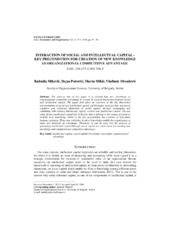Please use this identifier to cite or link to this item:
https://rfos.fon.bg.ac.rs/handle/123456789/1502Full metadata record
| DC Field | Value | Language |
|---|---|---|
| dc.creator | Miković, Radmila | |
| dc.creator | Petrović, Dejan | |
| dc.creator | Mihić, Marko | |
| dc.creator | Obradović, Vladimir | |
| dc.date.accessioned | 2023-05-12T10:59:30Z | - |
| dc.date.available | 2023-05-12T10:59:30Z | - |
| dc.date.issued | 2016 | |
| dc.identifier.issn | 0354-4699 | |
| dc.identifier.uri | https://rfos.fon.bg.ac.rs/handle/123456789/1502 | - |
| dc.description.abstract | Osnovni cilj rada je da prikaže na koji način se prirodnom interakcijom socijalnog i intelektualnog kapitala stvara novo znanje i organizaciona konkurentska prednost. Rad prvo daje prikaz ključnih teoretskih tumačenja socijalnog i intelektualnog kapitala a potom analizira kako strukturna, kognitivna i relaciona dimenzija socijalnog kapitala kroz razmenu i kombinovanje sa postojećim intelektualnim kapitalom stvara novi intelektualni kapital. Osnovna vrednost novog intelektualni kapitala se ogleda u činjenici da on pripada korpusu grupnog ili socijalno tacitnog znanja koje je ključan preduslov za stvaranje inovativnih poslovnih rešenja. Tako, ove nove kolektivne forme znanja omogućavaju organizacijama da izgrade i zadrže svoju prednost. Zato se i može reći da je proces generisanja intelektualnog kapitala posredstvom socijalnog kapitala vrednosna osnova za stvaranje novog znanja i organizacione konkurentske prednosti. | sr |
| dc.description.abstract | The primary aim of this paper is to present how new knowledge as organizational competitive advantage is created by natural interaction between social and intellectual capital. The paper first gives an overview of the key theoretical interpretations of social and intellectual capital and thereafter analyses how structural, cognitive and relational dimension of social capital, through exchanging and combining with existing intellectual capital, creates new intellectual capital. The key value of new intellectual capital lies in the fact that it belongs to the corpus of group or socially tacit knowledge which is the key precondition for creation of innovative business solutions. Thus, new collective forms of knowledge enable the organization to make and maintain its advantage. Therefore, it can be said that the process of generating intellectual capital through social capital is a value basis for creating new knowledge and organizational competitive advantage. | en |
| dc.publisher | Univerzitet u Nišu, Niš | |
| dc.rights | openAccess | |
| dc.rights.uri | https://creativecommons.org/licenses/by-nc-nd/4.0/ | |
| dc.source | Facta universitatis - series: Economics and Organization | |
| dc.subject | znanje | sr |
| dc.subject | socijalni kapital | sr |
| dc.subject | organizaciona prednost | sr |
| dc.subject | intelektualni kapital | sr |
| dc.subject | inoviranje | sr |
| dc.subject | social capital | en |
| dc.subject | organizational advantage | en |
| dc.subject | knowledge | en |
| dc.subject | intellectual capital | en |
| dc.subject | innovation | en |
| dc.title | Interakcija socijalnog i intelektualnog kapitala - ključni preduslov za stvaranje novog znanja i organizacione konkurentske prednosti | sr |
| dc.title | Interaction of social and intellectual capital: Key precondition for creation of new knowledge as organizational competitive advantage | en |
| dc.type | article | |
| dc.rights.license | BY-NC-ND | |
| dc.citation.epage | 86 | |
| dc.citation.issue | 1 | |
| dc.citation.other | 13(1): 73-86 | |
| dc.citation.rank | M51 | |
| dc.citation.spage | 73 | |
| dc.citation.volume | 13 | |
| dc.identifier.fulltext | http://prototype2.rcub.bg.ac.rs/bitstream/id/282/1498.pdf | |
| dc.identifier.rcub | conv_286 | |
| dc.type.version | publishedVersion | |
| item.cerifentitytype | Publications | - |
| item.fulltext | With Fulltext | - |
| item.grantfulltext | open | - |
| item.openairecristype | http://purl.org/coar/resource_type/c_18cf | - |
| item.openairetype | article | - |
| Appears in Collections: | Radovi istraživača / Researchers’ publications | |
Google ScholarTM
Check
This item is licensed under a Creative Commons License


